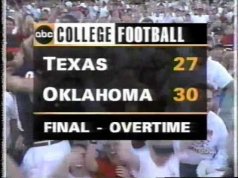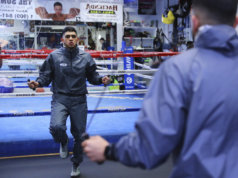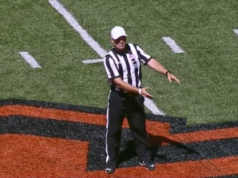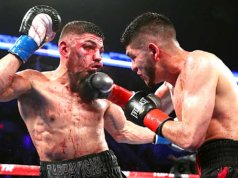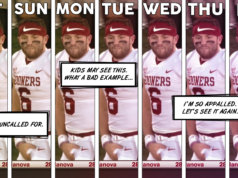
Good sports writing didn’t die on Oct. 30, but it surely took a heartrending blow.
ESPN shuttered its Grantland website just weeks ago, ending a four-year run as a safe zone for those wishing to absorb good writing on athletes, sports and even pop culture. While several writers and outlets offering top-notch sports writing still remain, the closure of Grantland ended one of the most visible products for those who care about well-written sports journalism.
By closing Grantland, ESPN all but acceded its spotlight to the “create debate” leanings of Skip Bayless, Stephen A. Smith, Tony Kornheiser, Michael Wilbon and a host of other talking — in reality, SCREAMING — heads espousing their frequently outlandish opinions on sports with few facts and little nuance.
Meanwhile, the excellent writings of Jonah Keri, Bill Barnwell, Steven Hyden, Jay Caspian Kang and others from the Grantland site find their access to mass media outlets diminished.
It wasn’t always like this.
Sports writing used to be a haven for excellent storytelling, analysis and hard news. On my bookshelf at home is a copy of “The Best American Sportswriting 1991.” It was a gift from my parents as I left for college in 1992, beginning my own quest to be a sports writer. In the now well-worn book, there are but a few opinion pieces. Most of the stories are features or analytical pieces. A few are investigative endeavors.
Those types of stories are what drove sports writing just two decades ago. There is a problem with this model, however: not enough fame for the writer.
While these great stories were being feted at journalistic gatherings and among other writers, the opinion columnists at newspapers and magazines — the ones with their mugs plastered under the headline — were getting all the buzz on the then-burgeoning medium of sports-talk radio. At the same time, these opinion columnists were the writers being lauded — or pilloried — by most sports fans.
Over time, their names became known by the public. The feature, news, analytical and investigative sports writers were not. Even when I was cutting my teeth at the college newspaper, it didn’t take a social-science professor to see where that trend was headed.
Writers, like any other humans — maybe more than other humans — have egos. The opportunity to make oneself famous — or infamous — can be too big to pass up. Over time and a changing media landscape beginning to be dominated by television, many sports columnists increased their volume, increased their opinion output and lost hold of the subtlety required for intelligent discussions.
Some sports writers even gave up writing altogether.
The appearance of shows on ESPN such as Pardon The Interruption and Around The Horn feature regional sports columnists on TV, spitting their arguments across an entirely different medium. Disregarding the lack of aesthetics (or hair) that most sports writers can offer a television show, the general public ate up the opinions spewed its way. Now, it is far harder to find a written story from Skip Bayless or Tony Kornheiser than it is to see their weathered mugs on TV shouting about some playing-field banality.
This phenomenon is not just a symptom of ESPN, Fox or other national sports “journalism” outlets. Budding sports writers at the college level appear to be more interested in seeing their opinions in print than actually doing interviews, collecting background research and putting together coherent stories. Feel free to check out a college student newspaper when you’re on campus anywhere in the country: While the newshole for a sports desk grows smaller and smaller, it’s nearly inevitable that each day’s section will feature an opinion column. These sports opinion columns are from 18-, 19- or 20-year-olds who might not have the life experience necessary to dial on a landline phone, but their journalistic judgment is often to use what little space their money-strapped college newspaper’s sports page can muster to let everyone know what they think the coach should do in the next big game.
Sports writing as an industry now seems less about informing a public, shining a light on issues or weaving together wonderful profiles on participants. It has become a megaphone for egotists.
Which brings us back to Grantland. When the site was founded in 2011, it seemed revolutionary in a kind of backward way. It was going to collect the best writers out there and set them free to write stories while giving them an audience that only an endeavor backed by ESPN could. These writers covered sports with a fervor, putting together wonderfully written pieces that would have easily fit among those featured in my Best American Sportswriting book.
There were even opinion columns, but the opinions were much more nuanced than those of the monorail salesmen you see on TV. Grantland proved to have room for all types of writers, and it soon became my favorite website to visit.
Now, the long-form sports journalism leader has shut down, a firm implication that this type of sports writing is no longer valued. Instead, we are left to ponder the irony of me complaining about these trends in an opinion piece on NonDoc, another site that attempts to approach sports a little bit differently.
There are plenty of great sports writers out there who still report first and deliver their opinions in a nuanced, well-written way. In fact, their opinion columns are so subtle, they sometimes blur the lines into pure analysis or feature writing. Joe Posnanski has my vote for the best current, living sports writer. The Oklahoma market is absolutely blessed to have Berry Tramel in its midst. Sports Illustrated continues to do a yeoman’s effort with long-form writing, even if OSU fans don’t like the content when it’s about their team.
Still, for every Posnanski or Tramel, there’s another sports writer frothing at the mouth to shout his or her opinion loudly.
In the end (of Grantland), perhaps we can recall some of its original purpose.
Grantland Rice, the godfather of sports writing and the namesake for ESPN’s former website, wrote a famous lead about the 1924 Notre Dame-Army football game: “Outlined against a blue-gray October sky, the Four Horsemen rode again. In dramatic lore they are known as famine, pestilence, destruction and death.”
I have a feeling the shuttering of his namesake website would leave Mr. Rice writing similar words concerning the ominous future of his beloved occupation.










